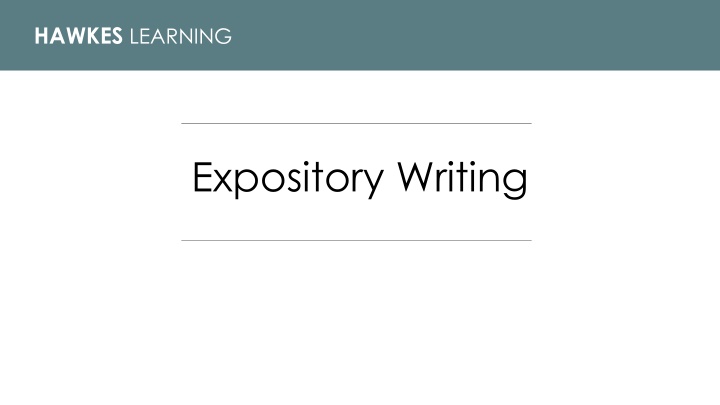
Mastering Expository Writing: Components, Thesis Statements & Organizational Strategies
Explore the key components of expository writing including thesis statements, evidence, and organizational strategies. Learn how to structure your writing effectively, use informative details, and craft compelling introductions and conclusions. Dive into the world of expository writing with confidence and skill.
Download Presentation

Please find below an Image/Link to download the presentation.
The content on the website is provided AS IS for your information and personal use only. It may not be sold, licensed, or shared on other websites without obtaining consent from the author. If you encounter any issues during the download, it is possible that the publisher has removed the file from their server.
You are allowed to download the files provided on this website for personal or commercial use, subject to the condition that they are used lawfully. All files are the property of their respective owners.
The content on the website is provided AS IS for your information and personal use only. It may not be sold, licensed, or shared on other websites without obtaining consent from the author.
E N D
Presentation Transcript
HAWKES LEARNING Expository Writing
Lesson Goals Components of Expository Writing Structuring Expository Writing Using Informative Details Relating Exposition to Other Modes HAWKES LEARNING
Components of Expository Writing The main idea, expressed as a thesis statement The evidence, or details that support the thesis HAWKES LEARNING
Components of Expository Writing Thesis Toni Morrison reflects the fragmentation of her characters lives through broken, abrupt syntax and sensory word choice. HAWKES LEARNING
Components of Expository Writing Thesis Toni Morrison reflects the fragmentation of her characters lives through broken, abrupt syntax and sensory word choice. Possible Evidence Quotes from Morrison s work, literary experts, and comparisons to similar works HAWKES LEARNING
Organizational Strategies Spatialorderdescribes a subject s physical characteristics. Chronologicalorder arranges the ideas or events in the order they occur. Order of importance organization arranges ideas from least important to most important point (or vice versa). HAWKES LEARNING
The Introduction Get the readers attention with a hook Provide important background information Express the thesis statement toward the end of your introduction HAWKES LEARNING
The Conclusion Why is my main idea important? What do I want my readers to learn? What do I want my readers to take away? What do I want my readers to do? HAWKES LEARNING
Using Informative Details Main idea Supporting Details Presented in a thesis Major details explain the statement main idea Makes a claim Minor details clarify major details HAWKES LEARNING
Relating Exposition to Other Modes Expository writing Other modes do not & requires a thesis always require a thesis statement HAWKES LEARNING






















